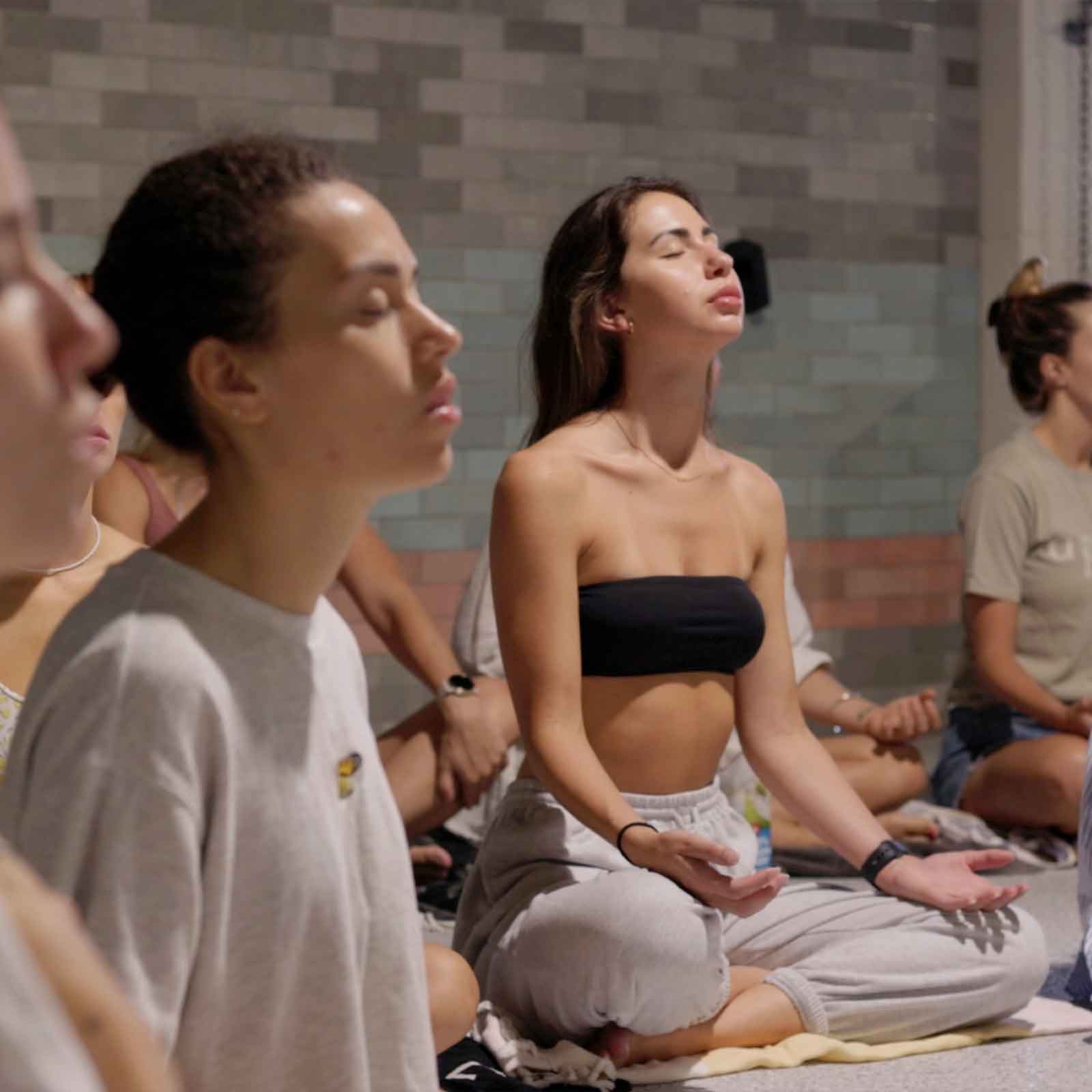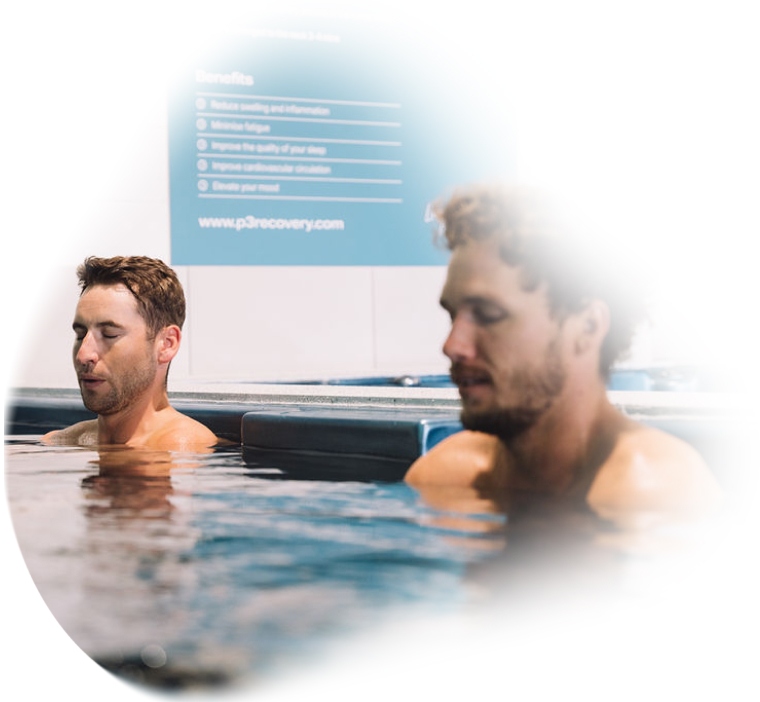"Team are always very friendly and accommodating. It’s always very clean and even during busy hours."
- Raissa Oliveira"P3 accelerates my recovery for high training & race preparation. The team & community are so supportive."
- Trent Gardiner"Great place to relax, unwind & friendly team. I come several times a week, there's something for everyone."
- Adrian Finch"P3 has changed my life. P3 feels like a second family. More than a recovery centre, P3 is a community."
- Brooke Coleman-Oakes"I had such a great time, the team were so helpful. A very welcoming vibe that made you want to just be there."
- Roxane Carbery


Whether you’re in the ice bath or the cold immersion pool, these techniques will enhance your experience and give you the tools you need to harness the power of your breath. Don’t miss out on this life-changing opportunity. Book your workshop today and choose from convenient weekday or weekend options.
Breathwork helps clear the mind and improve focus by increasing oxygen flow to the brain.
Controlled breathing can activate the body's relaxation response, reducing feelings of stress and anxiety.
Breathwork can increase endurance and help reduce muscle fatigue, leading to improved physical performance.
Controlled breathing can help release tension and increase oxygen flow, providing an energy boost and improving overall well-being.
Breathwork can help calm the mind and promote a deeper state of relaxation, leading to improved sleep quality.
Controlled breathing has been shown to boost the immune system and improve its ability to fight off illness and disease.
Breathwork can help release trapped emotions and reduce symptoms of depression, anxiety, and PTSD.
Breathwork can help increase self-awareness and emotional intelligence by helping individuals understand and regulate their emotions.

Heart rate variability (HRV) is more than a health metric; it's a profound indicator of your stress resilience and overall wellbeing. Learn the essentials of HRV and practical tips to enhance it for a healthier life.
In today’s fast-paced world, managing stress is crucial for maintaining mental and physical health. Explore five lifestyle hacks, from meticulous planning to amplifying your greens intake, to boost your stress resilience effectively.
Struggling to improve sleep quality? Uncover expert tips and strategies to enhance your sleep quality, ensuring better recovery, improved cognitive function, and a stronger immune system. Dive into our guide for a restful night and a productive day.
Discover the optimal hydrotherapy protocol to boost your sports recovery. Learn how the strategic use of warm and cold baths can elevate athletic performance and recovery.
Pain-free living with Hyperbaric Oxygen Therapy
The anti-inflammatory magic of Hyperbaric Oxygen Therapy
The Science Behind the Cold Plunge: Your Ultimate Ally in Post-Exercise Recovery!
Unlocking the Power of Cold Water Immersion: Boosting Brown Fat for Weight Loss
For athletes, fitness enthusiasts, and those seeking relief from the discomforts of intense physical activity, the quest for effective recovery strategies is never-ending.
In the bustling world of health and wellness, there's a buzz surrounding a unique therapy that holds the promise of revitalising our bodies from the inside out—Hyperbaric Oxygen Therapy (HBOT).
Breathwork is a practice that involves using specific breathing techniques to improve physical and emotional health. Breathwork can range from simple breathing exercises to more intensive, dynamic practices that aim to release emotional tension and increase physical energy. The practice of breathwork has been shown to help reduce stress, improve focus, increase energy levels, and boost the immune system.
Breathwork can also be used to facilitate emotional healing and increase self-awareness. It is important to note that while breathwork can provide numerous benefits, it is not a substitute for medical treatment and individuals should speak with their doctor before starting a breathwork practice. Breathwork can be practiced alone or in a group setting, and workshops or classes are also available for those interested in learning more about this practice.
Breathwork works by using specific breathing techniques to bring increased awareness and control to the breath. The breath is a powerful tool that can be used to influence physical and emotional states, and many breathwork practices aim to help individuals tap into this power.
By controlling the breath, individuals can change their state of consciousness and tap into deep inner resources to support physical and emotional healing. Breathwork can also help to increase oxygen flow to the body and brain, which can improve physical performance, mental clarity, and overall well-being.
Additionally, some breathwork techniques involve holding the breath, which can help to release built-up emotional and physical tension. Breathwork can be a powerful tool for self-discovery and personal growth, and can be used to support overall health and well-being.
Breathwork can be safe for most individuals, but it is important to consult with a doctor before starting a breathwork practice, especially for those with pre-existing medical conditions or those who are pregnant. Some breathwork techniques can be intense and may cause discomfort or lightheadedness, and individuals should be mindful of their physical and emotional limits while practicing breathwork.
It is also important to find a qualified and experienced breathwork practitioner or teacher to guide you through the practice and ensure that it is done safely and effectively. Breathwork can be a powerful tool for self-discovery and personal growth, but it is important to approach it with caution and seek professional guidance if necessary.
By following safety guidelines and listening to your body, breathwork can be a safe and effective way to improve physical and emotional well-being.
Breathwork offers numerous benefits for physical and emotional well-being. Some of the most notable benefits of breathwork include:
Reduced stress and anxiety: By controlling the breath and shifting into a state of calm, individuals can reduce stress and anxiety levels.
Improved respiratory function: Breathwork can help to improve lung capacity and overall respiratory function.
Increased energy and focus: Proper breathing techniques can increase oxygen flow to the body and brain, leading to increased energy and focus.
Improved sleep: By shifting into a state of calm and promoting relaxation, breathwork can also improve sleep quality.
Emotional healing: Breathwork can help to release pent-up emotions and promote emotional healing.
Increased physical performance: Improved respiratory function and increased oxygen flow to the body can also improve physical performance.
Better overall health: Breathwork can help to improve cardiovascular health, reduce inflammation, and boost the immune system.
Personal growth and self-discovery: Breathwork can be a powerful tool for self-discovery and personal growth, allowing individuals to tap into their inner resources and achieve a deeper sense of self-awareness.
By incorporating breathwork into your daily routine, you can tap into the many physical and emotional benefits it has to offer.
Incorporating breathwork into your daily routine can be easy and highly effective. Here are a few simple steps to get started:
Set aside a few minutes each day for breathwork: Dedicate a few minutes each day to practicing different breathing techniques, such as deep belly breathing or alternate nostril breathing.
Make it a habit: Over time, breathwork can become a habit, helping you to reduce stress and promote relaxation on a regular basis.
Practice before sleep: Incorporating breathwork into your bedtime routine can help you to fall asleep faster and enjoy a more restful sleep.
Practice in stressful situations: When faced with stress or anxiety, take a moment to pause and focus on your breath. This can help you to calm down and regain your composure.
Join a breathwork class: Consider joining a local breathwork class or participating in a workshop. This can help you to learn new techniques and deepen your practice.
Use breathing techniques during physical activity: Incorporating breathing techniques into your physical activity routine can help you to improve performance, reduce stress, and enhance overall well-being.
Use breathwork as a mindfulness tool: Whenever you feel overwhelmed or anxious, take a moment to focus on your breath. This can help you to shift into a state of calm and achieve a deeper sense of clarity and self-awareness.
By incorporating breathwork into your daily routine, you can tap into its many benefits and transform your physical and emotional health.
Breathwork, meditation, and yoga are all practices that promote relaxation and well-being. However, they each have unique differences:
Focus: Breathwork is focused specifically on the breath, while meditation focuses on quieting the mind and promoting inner peace. Yoga combines physical postures, breath control, and meditation to create a holistic practice.
Techniques: Breathwork uses specific breathing techniques to create a specific physiological response, while meditation and yoga utilize various techniques, such as visualization, mantra repetition, and physical postures, to achieve a state of relaxation and well-being.
Time commitment: Breathwork can be done in short bursts, making it a convenient option for those with limited time. Meditation and yoga often require a longer time commitment and more structured practice.
Level of intensity: Breathwork can be intense and transformative, as it has the potential to unlock and release suppressed emotions. Meditation and yoga, on the other hand, are often practiced for their calming and soothing effects.
Physical component: Yoga includes a physical component, while meditation and breathwork are primarily focused on mental and emotional well-being.
Ultimately, each of these practices has its own unique benefits and can be a valuable tool for promoting relaxation and well-being. Whether you prefer breathwork, meditation, or yoga, incorporating any of these practices into your daily routine can help you to achieve a greater sense of peace and happiness.
Yes, breathwork has been shown to have significant benefits in reducing stress and anxiety. The way that breathwork works is by helping to regulate the body’s nervous system, which is responsible for regulating our physical and emotional responses to stress. By controlling our breath, we can influence the activity of the nervous system and reduce feelings of stress and anxiety.
Breathwork has been found to have a calming effect on the mind and body. It helps to release tension in the muscles, slow down the heart rate, and reduce the levels of the stress hormone cortisol. It also stimulates the release of endorphins, the body’s natural feel-good chemicals, which can help to lift mood and reduce feelings of anxiety.
Incorporating breathwork into your daily routine can be a simple and effective way to manage stress and anxiety. Whether it’s taking a few minutes to practice deep breathing exercises, or participating in a more structured breathwork session, the benefits of this practice are many and can help to improve overall mental and emotional well-being.
Held on the P3 pool deck, you’ll be coached through optimal breathing techniques to manage stress response and improve performance before immersing yourself in our ice baths and accessing the benefits of cold-water immersion.
Then sit back and relax in our warm baths before enjoying a post class connect with your group. A progressive learning experience for all which will build resilience and an understanding of how to regulate your breathing under duress.
It’s a progressive learning experience for all, which will build resilience and an understanding of how to regulate your breathing under duress.
{{body}}
View More...